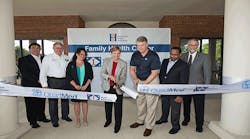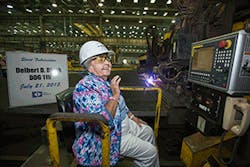A just-released survey by Mercer found that 29 percent of employers with 5,000 or more employees had on-site healthcare clinics. Sixty-three percent of those employers said they successfully reduced their lost workdays and 58 percent said the clinics helped employees manage chronic conditions, like diabetes.
The Mercer survey also cited the new healthcare center at Huntington Ingalls Industries (HII), the nation's largest military shipbuilder, as an example of what the future holds for work place health centers. HII’s health center is a full-service, primary care facility.
HII’s center, which opened in early July in Gautier, Miss., provides on-site doctors, a pharmacy, labs, X-ray services and physical therapy facilities. Eligible employees and dependents pay nothing for preventive care or wellness coaching and pay only a $15 fee for other visits, and they have access to on-going help with chronic diseases like diabetes. Ingalls Shipbuilding’s clinic has seen a steady increase in patients, and patient visits doubled in the first five weeks it was open. More important, almost 25 percent of the appointments have been wellness education appointments with the resident nurse educator and dietician.
“We want to be leaders in driving innovation and change in this arena,” said Edmond Hughes, vice president, human resources and administration for Ingalls Shipbuilding. "Manufacturers like us rely heavily on our workforce and we want to be partners with them in maintaining good health and providing affordable, easily accessible health care."
HII CEO and president Mike Petters led the effort to develop these centers as part of his commitment to skilled workforce development. A comparable health center is scheduled to open at their corporate headquarters and shipyard located in Newport News, Va., in January 2016. Along with their nationally renowned apprentice schools, full-service health centers are another key component to training and retaining skilled workers in manufacturing, according to Petters.
Hughes took some time to answer questions from EHS Today about the clinic and the company’s investment in employee wellness.
EHS Today: An undertaking like this is a huge, up-front financial commitment for an employer. Can you explain why this was important to Huntington Ingalls Industries and what you anticipate your return on investment to be, in terms of both benefit to employees and benefit to the bottom line of the business?
Hughes: Opening the family health centers is another element in HII’s commitment to building a culture of health and wellness across the company. We feel like this is an investment in our greatest asset – our employees and an investment in the health and wellness of them and their families. These family health centers will provide high-quality, affordable, convenient healthcare and wellness options and reduce barriers that many employees experience when seeking medical care. This convenience should lead to employees and their families becoming more engaged in their own health and increase their focus on preventative care.
One of the key expenses to the corporation is our overall health care costs. We know our dependents are a major driver in that. By providing health care centers, it allows us to address this cost issue.
We also know that our employees utilize the emergency room more than the national average. By offering a family health center, they will be able to have a primary care physician who will help them establish a long-term relationship with a provider, which will allow them to address potential longer-term health-related issues.
In shipbuilding, there are generations of families. And this family health center allows us to not only address our current employees but through their dependents, possible future employees.
EHS Today: Can you provide some insight into the services the workplace health center in Gautier offers employees and their families? And can you tell us how the program is managed? (For example, are employees allowed to schedule appointments during lunch breaks or other break times, are there programs for the workforce that are associated with the healthcare professionals at the clinic offer (brown bag lunch talks about wellness, etc.)?
Hughes: Services include: annual physicals, preventive screenings, X-rays and lab services; immunizations (all ages); health and wellness coaching and education; an on-site pharmacy; and non-occupational physical rehabilitation (arthritis, back/neck pain, muscle strains, etc.). Also, the cost for the health center is $15 per visit and preventive care visits are free.
The new on-site pharmacy (operated by CVS/caremark) will provide patients with affordable medications. A 30-day supply of generic prescription medication costs just $3. A 90-day generic supply cost $6.
Ingalls was recently recognized as a Platinum-status Fit-Friendly worksite by the American Heart Association. This status is given to worksites that implement physical and nutrition activities and demonstrate a behavior change or a cost-savings outcome due to its wellness culture. We encourage healthy lifestyle choices through various initiatives, including our fitness center, healthy choices on the cafeteria menu, our 5K on the Causeway event, biannual racquetball tournaments and the 10-week Active for Life fitness challenge sponsored by the American Cancer Society.
Telehealth services also are provided (or offered) through Teladoc. This allows eligible employees and their dependents 24/7 access to certified doctors via phone, mobile app or online video for non-emergencies. A consultation with Teladoc only costs eligible employees $10 and prescription can be called in to pharmacy of your choice, including our family health center.
The health center is being operated by QuadMed, a third-party vendor with 20 years of experience providing employees with quality healthcare. The services are available to all eligible employees and their dependents who are covered by the Anthem consumer-driven health plan or preferred-provider option plans.
EHS Today: What impact has the center had in terms of improved employee wellness?
Hughes: Our facility opened up on July 1 so it is still early in the stages, but we have been extremely pleased with the level of activity in the first two months of operations. For example, almost 53 percent of the people visiting the health center are dependents and we feel like that is an excellent rate of engagement for our employee’s family members.
EHS Today: Approximately how many people (employees and family members) take advantage of the services offered at the center?
Hughes: So far, approximately 1,400 people have utilized at least one of the services provided by the health center.
EHS Today: Can you offer a couple of anecdotal stories about employees who were helped by the services offered at the center?
Hughes: While the visits are confidential, we’ve received positive feedback. Employees have been extremely excited to share their experiences and interactions while visiting the center. There have been short wait times and longer periods of time spent with physicians or medical providers.
EHS Today: Has there been any concern from employees that their confidential medical information – perhaps information they would not want shared with their employer – will be shared? If so, how do you alleviate those fears?
Hughes: This has not been an issue. This is one of the things we wanted to ensure our employees understood immediately and we communicated this for a year before the center opened.
The family health center is operated by QuadMed. The health center will operate independently from our company and in full compliance with all federal aspects of Health Insurance Portability and Accountability Act (HIPAA) Privacy Rule. These rulings are in place to protect the privacy of personal health information.
When employees receive medical care, their medical record information is as private and protected as with any other physician. Our company does not have access to any private medical records or treatment details. Their information is protected by HIPAA laws that require this information remain private and protected.
EHS Today: Your CEO, Mike Petters, led this effort as part of his commitment to developing a skilled workforce. Do you find that amenities such as this make your company attractive to prospective employees? Do you see it as part of your recruitment efforts to attract top talent?
Hughes: We feel like in the future, employees will look back and see the family health center and what we provide in health care activities are one of the main reasons they joined our company. It is substantially different than what others are providing.
HII also offers apprentice schools for employees. Can you provide a little more information about that? Again, that's a huge investment in your workforce.
Hughes: The Apprentice School at Ingalls Shipbuilding accepts over 200 apprentices per year. The school offers two- to four-year, tuition-free apprenticeships in 13 trades. Apprentices work a 40-hour week and are paid for all work, including three of the four hours spent in academic classes. Through partnership with the Mississippi Gulf Coast Community College, the Apprentice School’s academic program provides the opportunity to earn an associate’s degree in maritime technology or a bachelor’s of science degree in applied technology.
Currently, there are approximately 700 apprentices and this is expected to grow to 800 by year’s end.
The Apprentice School at Newport News Shipbuilding accepts about 225 apprentices per year. The school offers four- to eight-year, tuition-free apprenticeships in 19 trades and eight optional advanced programs. Apprentices work a 40-hour week and are paid for all work, including time spent in academic classes. Through partnerships with Thomas Nelson Community College, Tidewater Community College and Old Dominion University, the Apprentice School's academic program provides the opportunity to earn associate degrees in business administration, engineering and engineering technology and bachelor's degrees in mechanical or electrical engineering.
EHS Today: Can you offer some insight – and it can be purely anecdotal – about how these investments in training and worker wellness have impacted your company, employee safety and your corporate reputation?
Hughes: It truly is a significant investment in the future of our company. Shipbuilding is a labor-intensive business and it’s not extremely easy work. So having employees who are healthy and who are able to work a full career and become master shipbuilders – 40 years of service – proves this investment.
Establishing a culture of health and wellness is critically important to our success and as organization. It absolutely gives us a distinct competitive advantage as we move forward.
To give you an idea of the size of the projects undertaken by the shipbuilders at HII, this YouTube video from HII shows the National Security Cutter Monro being translated via Ingalls’ rail car system to the floating dry dock one week prior to launch. The dock was moved away from the pier and then flooded to float the ship. With the assistance of tugs, Munro came off the dock Sept. 12.




